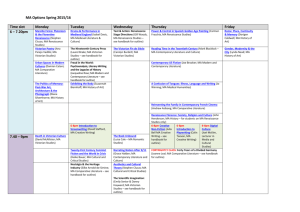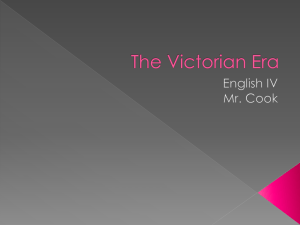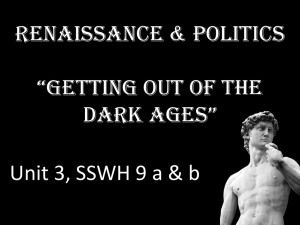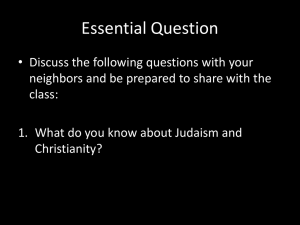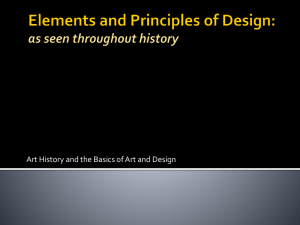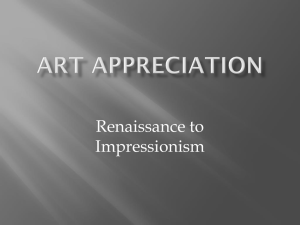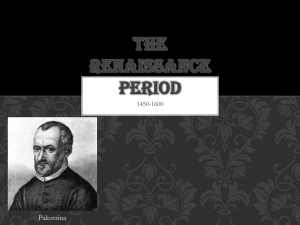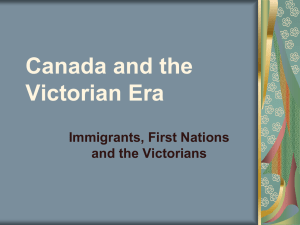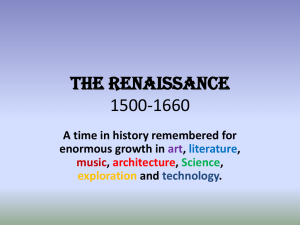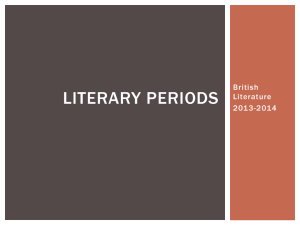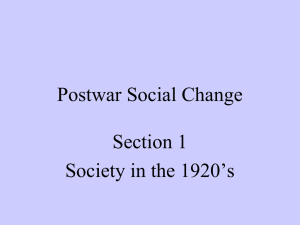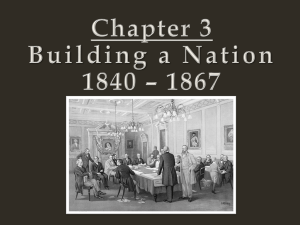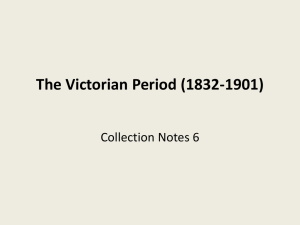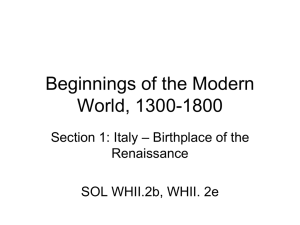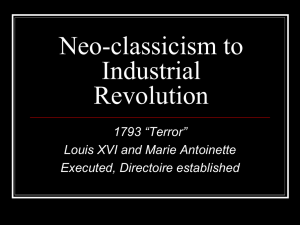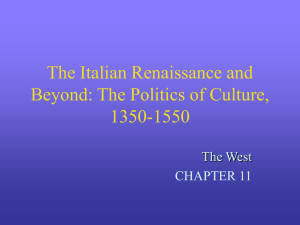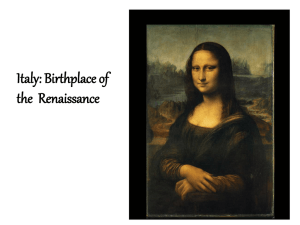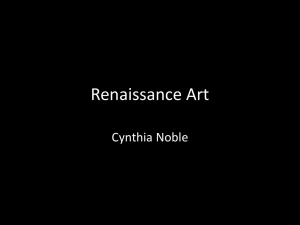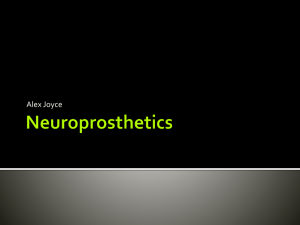A History of British Literature
advertisement
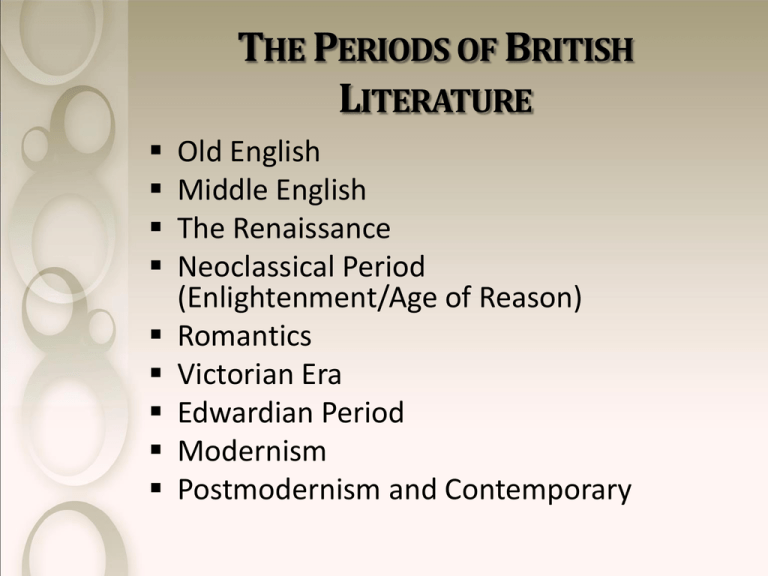
THE PERIODS OF BRITISH LITERATURE Old English Middle English The Renaissance Neoclassical Period (Enlightenment/Age of Reason) Romantics Victorian Era Edwardian Period Modernism Postmodernism and Contemporary OLD ENGLISH 680-1066 Around 450, Germanic tribes-Angles, Saxons, and Jutes-began the invasion of Britain.. By 600, Anglo-Saxons conquer the Britons • language becomes more Germanic and is unrecognizable as modern English Beowulf (please see next slide) is an example of this language OLD ENGLISH TEXT Hwæt. We Gardena in geardagum, LO, praise of the prowess of people-kings þeodcyninga, þrym gefrunon, of spear-armed Danes, in days long sped, hu ða æþelingas ellen fremedon. we have heard, and what honor the athelings won! Oft Scyld Scefing sceaþena/ þreatum, Oft Scyld the Scefing from squadroned foes, MIDDLE ENGLISH 10661500 Language – The MOST significant shift in language occurs at this time. Language shifts from unrecognizable, to decipherable (see next slide). Works frequently of a religious content Written for performance at court or for festivals Literature often contains a long composition describing the life and adventures of a noble hero Theme – loyalty to king and his lord • Arthurian Legend: King Arthur and his Knights of the Round Table • Geoffrey Chaucer: The Canterbury Tales MIDDLE ENGLISH TEXT Wan that Aprille with his sure-es so-tut The drewgt of march hath pearsaid to the row-tuh When April with his showers sweet with fruit The drought of March has pierced into the root THE RENAISSANCE (15001660) “Renaissance” means “Rebirth”-Rebirth of interest in the Greek and Latin classics This is one of the greatest times of expansion for Britain. Focus on the individual Cultivation of human potential through proper education; focus on individual consciousness and the Interior mind Concern with the refinement of the language and the development of a national, vernacular literature THE RENAISSANCE Noted authors during this time were Christopher Marlowe and William Shakespeare Marlowe: The Tragical History of Doctor Faustus Shakespeare • Romeo and Juliet • Hamlet • A Midsummer Night’s Dream NEO-CLASSICS AND ENLIGHTENMENT 1660-1785 Reaction to the expansiveness of the Renaissance in the direction of order and restraint. Emphasized classical ideals of rationality and control (human nature is constant through time). Art should reflect the universal commonality of human nature. (“All men are created equal.”) Reason is emphasized as the highest faculty (Deism). NEOCLASSIC NOTED AUTHORS John Locke John Milton (Paradise Lost) Alexander Pope (Essay on Man) Jonathon Swift (Gulliver’s Travels) Henry Fielding (Tom Jones) Daniel Defoe (Robinson Crusoe) Jane Austen (Sense and Sensibility, Emma, Pride and Prejudice) ROMANTIC PERIOD (1785-1830) Poetry is the common form of writing. Reaction against the scientific rationality of Neoclassicism and the Industrial Revolution. Emphasized individuality, intuition, imagination, idealism, nature (as opposed to society & social order). Elevation of the common man. Mystery and the supernatural ROMANTIC NOTED AUTHORS Robert Burns (“To a Mouse”) William Blake (Songs of Innocence, Songs of Experience) William Wordsworth (Lyrical Ballads) Samuel Taylor Coleridge (“Kubla Kahn”) Lord Byron (“Don Juan”) Percy Bysshe Shelley (“Ozymandias”) John Keats (“Ode on a Grecian Urn”) VICTORIAN ERA (1830-1901) Named for the reign of Queen Victoria, Britain’s longest reigning monarch. Britain is at the height of its power during this era. This is as a result of Imperialism (acquisition of as much foreign territory as possible – often through force or coercion). British society extremely class conscious. Generally emphasized realistic portrayals of common people, sometimes to promote social change. LITERATURE AND THE VICTORIANS The novel is the dominant form of literature during this time period. Victorian literature was notable for the creation of atypical heroes. This was a response to Imperialism and fear about the following: • • • • change instability fluctuation of beliefs assimilation VICTORIANS, CONT. Charles Dickens (Great Expectations) Thomas Hardy (Tess of the D’Ubervilles) Rudyard Kipling (Jungle Book) Lewis Carroll (Alice’s Adventures in Wonderland) Charlotte Brontë (Jane Eyre) Emily Brontë (Wuthering Heights) Alfred, Lord Tennyson (In Memoriam) Robert Browning (“My Last Duchess”) Oscar Wilde (The Importance of Being Earnest) EDWARDIAN PERIOD 1901-1914 Named for King Edward. Some see as a continuation of Victorian Period; however, the status quo is increasingly threatened. Distinction between literature and popular fiction. Joseph Conrad (Lord Jim, Heart of Darkness), H.G. Wells (War of the Worlds), E.M. Forster (A Room with a View, A Passage to India), George Bernard Shaw (Major Barbara) MODERN (1914-1945) Reaction against the values which led to WWI. If previous values are invalid, art is a tool to establish new values (Pound: “Make it new”). Writers experiment with form. Form and content reflect the confusion and vicissitudes of modern life. Expositions and resolutions are omitted; themes are implied rather than stated. Dystopian is a common theme – born out of a fear of totalitarian power post WWI MODERN PERIOD Poetry: T.S. Eliot (The Waste Land) W.B. Yeats (The Wanderings of Oisin and Other Poems, The Swans at Coole) Fiction: James Joyce (Dubliners) D.H. Lawrence (The Rainbow) Virginia Woolf (To the Lighthouse). POST-MODERN PERIOD (1945-?) Period begins with the end of World War II Influenced by Freud, Sartre, Camus, Derrida, and Foucault. Deconstruction: Text has no inherent meaning; meaning derives from the tension between the text’s ambiguities and contradictions revealed upon close reading. (Rosencrantz and Guildenstern are Dead) Some believe it leads directly to the countercultural revolution of the 1960s.

